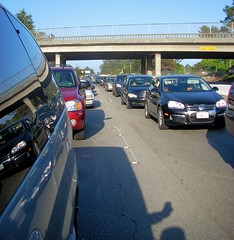I really like the vibration absorbing properties of my old steel bikes as well as my Specialized Roubaix. The Roubaix features Specialized’s “Zertz” inserts, which supposedly enhances the vibration damping qualities of my carbon fiber frame.
Zertz, apparently, is also making me fat. According to recent research, sitting on a vibrating platform can build bone mass and reduce fat. The vibrations apparently trigger stem cells into becoming bone instead of fat. The same principle is probably in action when you sit in a reclining chair, which tend to be very well padded to minimize vibrations.
To lose weight, then, you need more vibrations. Them hipster kids on the harsh-riding track bikes are so skinny, so maybe it’s time for me to trade in my comfy Roubaix for something like the ultra stiff Scott CR1. Maybe Fatty needs to ride bumpy singletrack on a fully rigid mountain bike.
Read or listen: Vibrations Shown to Build Bone, Reduce Fat.
